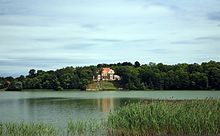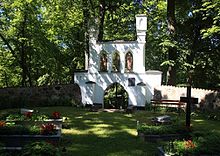Ublik
| Ublik | ||
|---|---|---|

|
|
|
| Basic data | ||
| State : | Poland | |
| Voivodeship : | Warmia-Masuria | |
| Powiat : | Pisz | |
| Gmina : | Orzysz | |
| Geographic location : | 53 ° 53 ' N , 21 ° 54' E | |
| Residents : | 58 (March 31, 2011) | |
| Postal code : | 12-250 | |
| Telephone code : | (+48) 87 | |
| License plate : | NPI | |
| Economy and Transport | ||
| Street : | ( Danowo -) DK 63 ↔ Buwełno - Cierzpięty | |
| Rail route : | Lötzen – Johannisburg , closed in 1945 | |
| Next international airport : | Danzig | |
Ublik ( German Ublick ) is a village in the Polish Warmian-Masurian Voivodeship and belongs to the Gmina Orzysz ( urban and rural municipality Arys ) in the Powiat Piski ( Johannisburg district ).
Geographical location
Ublik is located on the western shore of the Ublick Lake ( Jezioro Ublik Mały in Polish ) in the eastern center of the Warmian-Masurian Voivodeship . It is 30 kilometers south to the district town of Pisz ( German Johannisburg ).
history
Ublick was founded in 1539 - as Freigut to köllmischem law . The Ublick estate developed into a very large estate and was owned by the Kullak-Ublick family from 1788 to the 1920s , before the Engelmann brothers took it over as the last German owners. The estate last comprised 1,524 hectares of land with five farms , a distillery and a potato drying plant.
On April 8, 1874, Ublick became an official village and gave its name to an administrative district . It existed until 1945 and was part of the circle Johannesburg in Administrative district Gumbinnen (1905: Administrative district Allenstein ) in the Prussian province of East Prussia .
In 1910, 263 inhabitants were registered in the Ublick manor . On September 30, 1928, the Ublick manor district was converted into a rural community of the same name. The population was 256 in 1933 and rose to 320 by 1939.
Due to the provisions of the Versailles Treaty , the population in the Allenstein voting area , to which Ublick belonged, voted on July 11, 1920 on whether they would continue to belong to East Prussia (and thus to Germany) or join Poland. In Ublick 160 residents voted to remain with East Prussia, Poland did not receive any votes.
When the whole of southern East Prussia was transferred to Poland in 1945 as a result of the war , this also affected the village of Ublick. It received the Polish name form "Ublik" and is today the seat of a Schulzenamt ( Polish Sołectwo ) and thus a place in the network of the city and rural community Orzysz ( German Arys ) in the Powiat Piski ( Johannisburg district ), until 1998 the Suwałki Voivodeship , since then Warmian-Masurian Voivodeship .
District of Ublick (1874–1945)
The administrative district Ublick was originally divided into two municipalities: the manor district Lötzen, domain office, and the manor district Ublick. On September 1, 1931, however, it only consisted of the village of Ublick itself, which has since been converted into a rural community. It remained that way until 1945.
church
Until 1945 Ublick was a parish in the Protestant Church of Arys in the church province of East Prussia of the Church of the Old Prussian Union and in the Roman Catholic Church of Johannisburg ( Pisz in Polish ) in the Diocese of Warmia .
Today, on the Catholic side, Ublik belongs to the parish in Orzysz in the Diocese of Ełk of the Roman Catholic Church in Poland . The Protestant residents stick to the parish in the district town of Pisz in the diocese of Masuria of the Evangelical-Augsburg Church in Poland .
school
Ublick became a school location in 1845.
Attractions
manor
The manor house in Ublick, which still exists today, was built in neo-Gothic style in the 19th century. During the First World War , the building was partially destroyed and it was rebuilt in neo-baroque style using many field stones . In 1945 the house burned down again. A renewed reconstruction including the still standing outer walls takes place in the 1960s. While it was temporarily used as a rest home, today it functions as a hotel and is privately owned.
Park cemetery
In 1992 and 1993 the park cemetery on the high lakeshore with the graves of the Kullak-Ublick family was restored. It is surrounded by a stone wall with a neo-Gothic entrance gate, in the crown of which the figures of Christ , Peter and Paul can be seen. These are copies, the originals are in the museum in Pisz (Johannisburg) .
traffic
Ublik lies to the west of the Polish state road 63 ( formerly German Reichsstraße 131 ), which is important for traffic , from which the village takes the side road 1698N, which continues as a land route to Buwełno (Buwelno , 1938 to 1945 Vorwerk Ublick) and Cierzpięty (Czierspienten , 1905 to 1945 Above sea level) .
There is no longer a train connection. From 1905 to 1945 Ublik was a train station on the Lötzen – Johannisburg railway line , which was shut down and partially dismantled as a result of the war.
Web links
Individual evidence
- ^ CIS 2011: Ludność w miejscowościach statystycznych według ekonomicznych grup wieku , March 31, 2011, accessed on April 21, 2019 (Polish).
- ↑ Polish Postal Code Directory 2013, p. 1312
- ↑ Dietrich Lange, Geographical Location Register East Prussia (2005): Ublick
- ↑ a b c Overview - family research Sczuka
- ↑ a b c Ublik - overview at ostpreussen.net
- ↑ a b c Rolf Jehke, Ublick district
- ^ Uli Schubert, community directory, district Johannisburg
- ^ Michael Rademacher: German administrative history from the unification of the empire in 1871 to the reunification in 1990. District Johannisburg (Polish Pisz). (Online material for the dissertation, Osnabrück 2006).
- ↑ Herbert Marzian , Csaba Kenez : "Self-determination for East Germany - A Documentation on the 50th Anniversary of the East and West Prussian Referendum on July 11, 1920"; Editor: Göttinger Arbeitskreis , 1970, p. 78
- ↑ Gmina Orzysz
- ^ Walther Hubatsch , History of the Protestant Church in East Prussia , Volume 3 Documents , Göttingen 1968, p. 491




